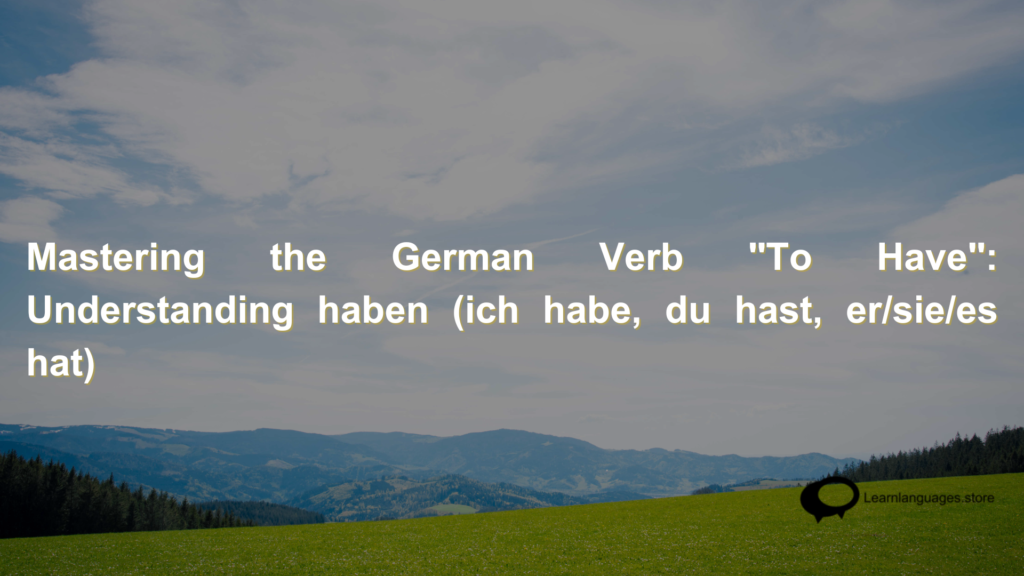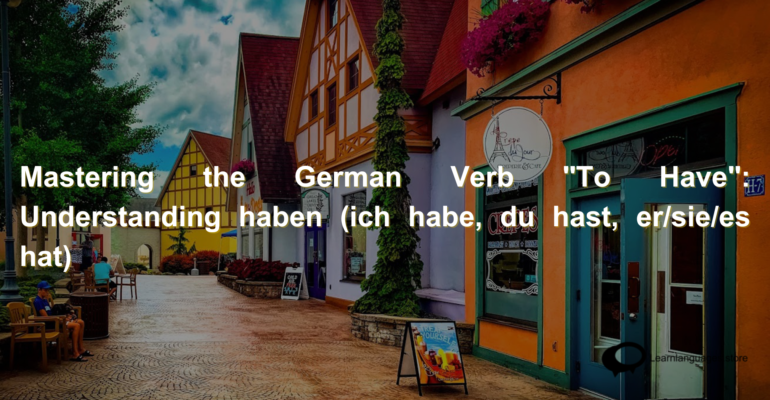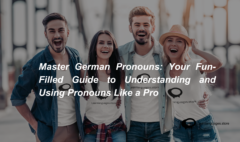Mastering the German Verb “To Have”: Understanding haben (ich habe, du hast, er/sie/es hat)
Mastering the German Verb “To Have”: Understanding haben (ich habe, du hast, er/sie/es hat)
Estimated reading time: 5 minutes
Welcome to the Learn Languages Store blog! In this post, we will focus on one of the most essential verbs in the German language: haben (to have). This verb is not only fundamental for everyday conversation but also plays a crucial role in forming various tenses and constructing meaningful sentences. We’ll cover its conjugation, provide examples, and offer pronunciation guides to help you use haben effectively.

The Importance of the Verb haben
The verb haben is an irregular verb in German, meaning it doesn’t follow the regular conjugation patterns. Understanding how to use haben correctly is vital for expressing possession, forming compound tenses, and communicating various ideas related to ownership and experiences.
-
Product on sale
 German B1
German B1₹32,600.00
₹42,600.00 -
Product on sale
 German A2
German A2₹24,300.00
₹32,600.00
Conjugation of haben (togehave)
Here’s how haben is conjugated in the present tense:
- ich habe (I have)
- du hast (you have – singular, informal)
- er/sie/es hat (he/she/it has)
- wir haben (we have)
- ihr habt (you have – plural, informal)
- sie/Sie haben (they/you have – formal)
Example Sentences for haben
Here are five example sentences using the verb haben, along with word-to-word translations and pronunciation guides:
- Ich habe ein Buch.
(I have a book.)
Pronunciation: इच हाबे आइने बुच। - Du hast viele Freunde.
(You have many friends.)
Pronunciation: डु हस्ट फील फ्रोइंडे। - Er hat ein neues Auto.
(He has a new car.)
Pronunciation: एर हाट आइने नॉइज़ आटो। - Wir haben einen Hund.
(We have a dog.)
Pronunciation: वीर हाबेन आइने हुन्ट। - Sie haben Glück.
(They have luck.)
Pronunciation: सी हाबेन ग्लुक।
Practical Uses of haben
- Expressing Possession: The verb haben is commonly used to indicate ownership or possession.
- Example: Ich habe ein Haus.
(I have a house.)
Pronunciation: इच हाबे आइने हाउस।
- Example: Ich habe ein Haus.
- Talking About Experiences: You can use haben to express experiences.
- Example: Wir haben Spaß.
(We have fun.)
Pronunciation: वीर हाबेन स्पास।
- Example: Wir haben Spaß.
- Forming Perfect Tenses: In German, haben is used as an auxiliary verb to form the perfect tense.
- Example: Ich habe gegessen.
(I have eaten.)
Pronunciation: इच हाबे गेगेस्सेन।
- Example: Ich habe gegessen.
- Stating Emotions: You can express emotions using haben.
- Example: Ich habe Angst.
(I have fear.)
Pronunciation: इच हाबे आंगस्ट।
- Example: Ich habe Angst.
- Describing Conditions: Use haben to describe states or conditions.
- Example: Wir haben Hunger.
(We are hungry.)
Pronunciation: वीर हाबेन हंगर।
- Example: Wir haben Hunger.
Why Learning haben Matters
Mastering the verb haben is essential for building a strong foundation in German. It not only allows you to express possession and experiences but also prepares you for more complex grammatical structures. Knowing how to use haben will enhance your conversational skills and confidence in the language.
Join Our Paid Courses for Enhanced Learning
At Learn Languages Store, we offer a comprehensive A1 level German course designed to help you master essential concepts like the verb haben and more! For just Rs 16,300/-, you will gain access to structured lessons, interactive exercises, and expert guidance that will transform your language skills.
Contact Us for More Information
If you’re interested in enrolling in our courses or have any questions, please reach out to us:
Learn Languages Store
330, 3rd Floor, Big Splash
(Near Vashi Bus Depot), Sector 17
Vashi, Navi Mumbai, Maharashtra 400703
Phone: +91-9594113111
Email: services@learnlanguages.store
Learning a new language is a rewarding experience that opens doors to new opportunities. Don’t miss the chance to enhance your skills with our expert-led courses!










